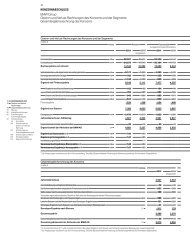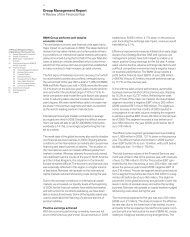Global Compact Case Study 2002 - BMW Group
Global Compact Case Study 2002 - BMW Group
Global Compact Case Study 2002 - BMW Group
Create successful ePaper yourself
Turn your PDF publications into a flip-book with our unique Google optimized e-Paper software.
<strong>BMW</strong> CleanEnergy Project.<br />
<strong>Global</strong> <strong>Compact</strong> <strong>Case</strong> <strong>Study</strong> <strong>2002</strong>.<br />
The ”Hydrogen Project Airport Munich” is the first fully automated public<br />
Hydrogen Filling Station at the Munich Airport. This project is designed to<br />
demonstrate the feasibility for potential customers and is financially supported by<br />
the Bavarian Ministry for Economy, Traffic and Technology.<br />
Along with nine partners and support from the European Commission, the<br />
<strong>BMW</strong> <strong>Group</strong> founded the ”European Integrated Hydrogen Project ” to develop a<br />
dual-approach strategy for hydrogen- top-down to provide assistance in framing<br />
the necessary legislation and bottom-up to develop the necessary technology.<br />
In 2001, the <strong>BMW</strong> <strong>Group</strong> set off with the full fleet of hydrogen cars on the<br />
CleanEnergy WorldTour. The CleanEnergy WorldTour concept is to globally<br />
raise awareness and build up a long-term stable political framework for a vision of<br />
a sustainable future, based on a hydrogen economy and society (as opposed to<br />
an oil-economy and society). Each location stop-over of the CleanEnergy<br />
WorldTour provided different focus depending on the location (e.g. possibility of<br />
hydrogen generation through renewable solar energy in Dubai, zero emission in<br />
Los Angeles, European political framework in Brussels).<br />
On an educational front, the <strong>BMW</strong> <strong>Group</strong> has implemented distribution of<br />
learning material for schools, which allows them to educate the students<br />
regarding sustainable energy and the possibilities about a future hydrogen-based<br />
economy. This material is currently available in German, English and Mandarin.<br />
Since 2003, the <strong>BMW</strong> <strong>Group</strong> displays tomorrow’s hydrogen mobility in the<br />
traffic centre of the Deutsches Museum in Munich. As a founder member of the<br />
traffic centre, the <strong>BMW</strong> <strong>Group</strong> underlines its commitment to the hydrogen<br />
technology in both an interesting and entertaining exhibition.<br />
Already in the year 2000, the cooperation between the Deutsches Museum and<br />
the <strong>BMW</strong> <strong>Group</strong> led to a large display of CleanEnergy in the framework of the<br />
EXPO project.<br />
In 2004, the <strong>BMW</strong> <strong>Group</strong> launched the CleanEnergy project in China. In<br />
conjunction with the Science & Technology Museum in Beijing, the <strong>BMW</strong> <strong>Group</strong><br />
opened a CleanEnergy exhibition. It showed the complete hydrogen cycle and<br />
provided an interactive and informal means of experiencing and learning about<br />
the production, distribution and application of hydrogen.<br />
On September 19 th 2004, the hydrogen race car <strong>BMW</strong> H 2 R set up 9 records on<br />
the Miramas proving grounds. The homologation of the records is subject to FIA<br />
recognition. Highlighted by a top speed above 300 km/h, the <strong>BMW</strong> <strong>Group</strong> has<br />
clearly proven its conviction that hydrogen is able to replace conventional fuel<br />
without requiring the driver to make the slightest compromise in terms of<br />
dynamic, up-to-date performance.<br />
<strong>BMW</strong> <strong>Group</strong>


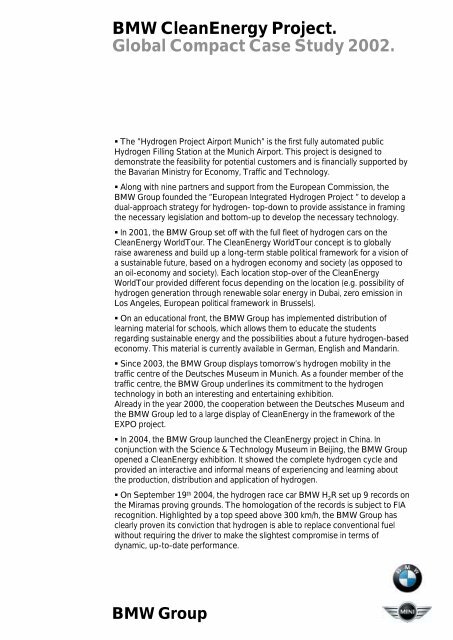
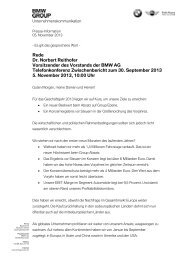
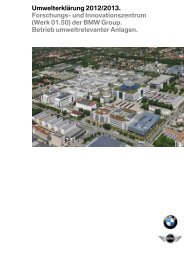
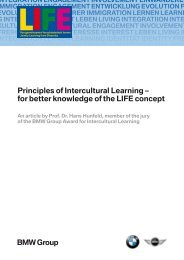
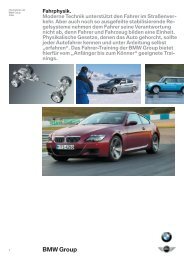
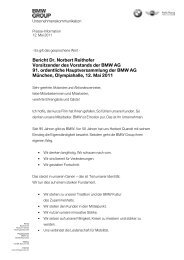
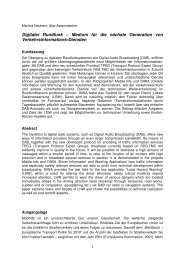
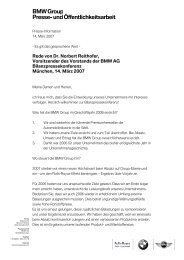
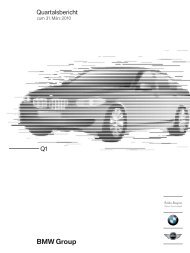
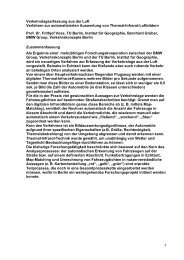
![Vollständiger Bericht [PDF] - BMW Group](https://img.yumpu.com/20706531/1/190x238/vollstandiger-bericht-pdf-bmw-group.jpg?quality=85)



